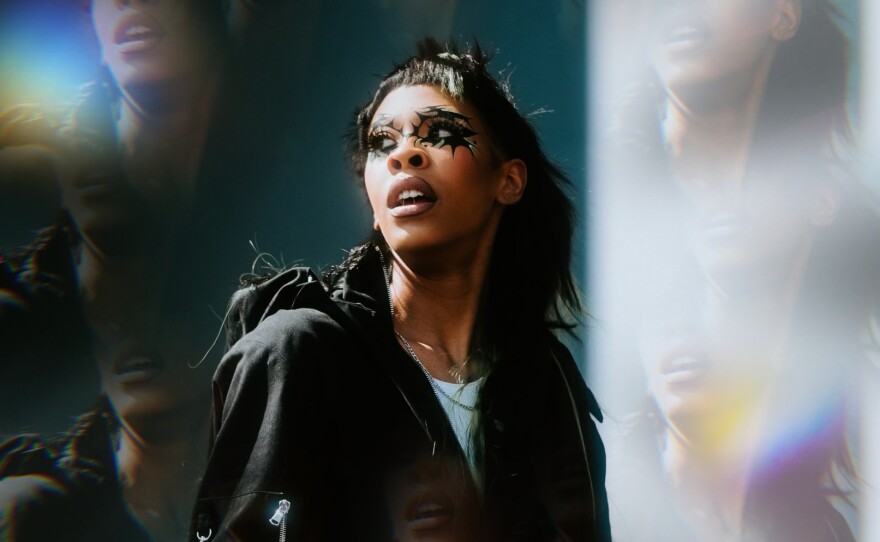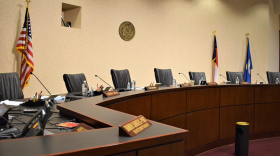Everyone sees candid photos of their favorite athletes and celebrities, but who captures those unforgettable moments? Mike Jones is a digital designer and photographer for the NBA's Charlotte Hornets.
Previously, he was the director of creative media for football at North Carolina State University. With freelance work for some major clients like rappers Trippie Redd, H.E.R, and Chris Brown, his dedication to his craft has granted him some once-in-a-lifetime opportunities.
Born on the coast of the Carolinas and raised in Raleigh, Jones has been a creator since he was a kid.
"Growing up (in Raleigh) I was very heavily influenced by like music, art, basketball," he says.
He credits his family's support as the source of his initial interests.
"My family invested in every aspect of my siblings and I ... so every time we wanted to do something... they would go out their way to make it happen… We wanted to do sports and music," Jones said. "They were buying instruments, subscriptions, putting us in camps and trainings."
After a while, he realized that photography was a medium that allowed him to exercise both his love for art and sports. Living in the “Hoop State” he found his initial niche in sports photography.
Jones obtained a B.S. in Sport Management with a minor in Coaching from Liberty University in 2018. From there he interned at Wake Forest University where he first picked up a camera and the skills that would eventually shape his career.
Follow @915wunc and @wuncyouthvoices to keep up with the Youth Reporting Institute and watch episodes of Changing Channels.
Jones spoke with Caitlin Leggett for an episode of Changing Channels. This interview has been lightly edited for brevity and clarity.
When did you first pick up a camera?
"I really didn't touch it until after I started working in sports, so 2018. I was at Wake Forest, interning right after graduation and I was doing coaching and recruiting at the time so I had no type of creative interest at all… I wanted to be a coach, I wanted to be a scout in the league. So literally in 2018, I went down to the video department and said, 'Hey, I want to learn how to use a camera.' Ben Baker, the director, just gave me some random camera and was like, 'Go shoot.' ... So, I went out there and shot practice, had no idea what I was doing, but it looked good, so I was like, 'Alright, I'm going to keep snapping.' No settings, no nothing, I had no idea what I was doing. No editing at all… I was editing on Photoshop, you know, on my phone and I start to like see this is a cool thing."
So, when did you start taking it seriously?
"I did not shoot for a year (after that). I moved back home and start working at (UNC) and I was shooting football there too… I stayed at UNC for two years still shooting there and then I got hired on as the director of creative media for football at N.C. State. I started doing more like graphics and everything self-taught, I had help along the way… It was also like, now I'm being the boss of somebody and then building a team, I had no idea what I was doing but my counterpart, Maurice Moses was always like 'We're going to figure it out.' He's a Director of Creative Video at (N.C. State) now but we kind of built everything together ... He and Annabelle Myers kind of taught me how to be a director."
What was that moment that you were like, "Okay, I can start calling myself a photographer"?
"I did not call myself a photographer for the longest. I think I was in a pit for Dreamville Fest and it was my first time shooting (the rapper J. Cole). And literally when he came out, obviously there's like all lights, the aesthetic wasn't a good thing to shoot. But I looked up, he was walking out, and it just hit me that 'It's crazy I'm actually, a photographer.' The year before that I was sitting in the stands just watching."
What does a typical day look like at the Hornets?
"If it's a home game… I get there at like noon or 1 p.m. and the players don't get there till sometime after. So, when that time comes I go down to the tunnel and shoot the players walking in... Typically, we have a lot of pregame events that we had to cover in the arena so it's obviously more spread out. (Other photographers) they'll cover it a bit and get it edited and posted. And then I go down to the arena floor around 6:30 p.m. for the team to do warm-ups. And then after that, the game kicks off at 7 p.m. I'm down on the floor shooting the majority of the game. Sometimes I'll be up on the media row, editing photos, and doing in-game graphics, but the majority of the time, I’m shooting the game then when it’s over I head back up to the media row, and assist with post-game content and whatever my team needs."
Talk to me a little bit about some of the hardships as far as being a photographer.
"I wish the community was more collaborative. The jealousy and the competing and all that, I think that makes photography harder, you know what I'm saying? I don't see the need to like have... in direct conflict with people, you know? A lot of times with bigger projects, you need multiple people. Especially like big projects for companies, you need multiple shooters right, but it's hard to do that when you can't turn to them. Because everybody wants to be like, 'They don't want to work together.' I feel like everybody can eat if everybody collaborates… It's literally like the crabs-in-the-bucket mentality."
How do you create a community within the medium?
"I try to give people their flowers, especially in photography because I feel like... it's a lot of gatekeeping. There's a lot of imposter syndrome and there's a lot of like jealousy when people are doing things. I'm not like that. Everybody that I came to as a student gave me my flowers and I'm a fan of them, you know what I'm saying? I never realized how much I inspire people... by just doing what I do."
Think a little bit about coming up in Raleigh, what type of impact or legacy do you want to leave?
"My hopes are to open up a huge production studio in Raleigh. So, I got the building picked out, and everything. I've been saving up for it. Obviously, it's going to be crazy expensive… But I want it to be like an actual big production studio where it's like people flying in for music videos, photoshoots, commercials everything to do with creatives.
"The main thing too… is that people think that in order to make things like that happen, you have to move off. I want to be one person that stays in North Carolina and still does it… Certain people have like moved off and popped off but I feel like now that I'm creating my legacy... I never had to move... Even right now, I’m two hours down the road in Charlotte for a job but like I never had to move out or put myself in the environment temporarily to make it big."
Jones has goals that extend far beyond what he was willing to share, but for now, he’s enjoying the moment. See more of his work on social media @mikejonesnc














